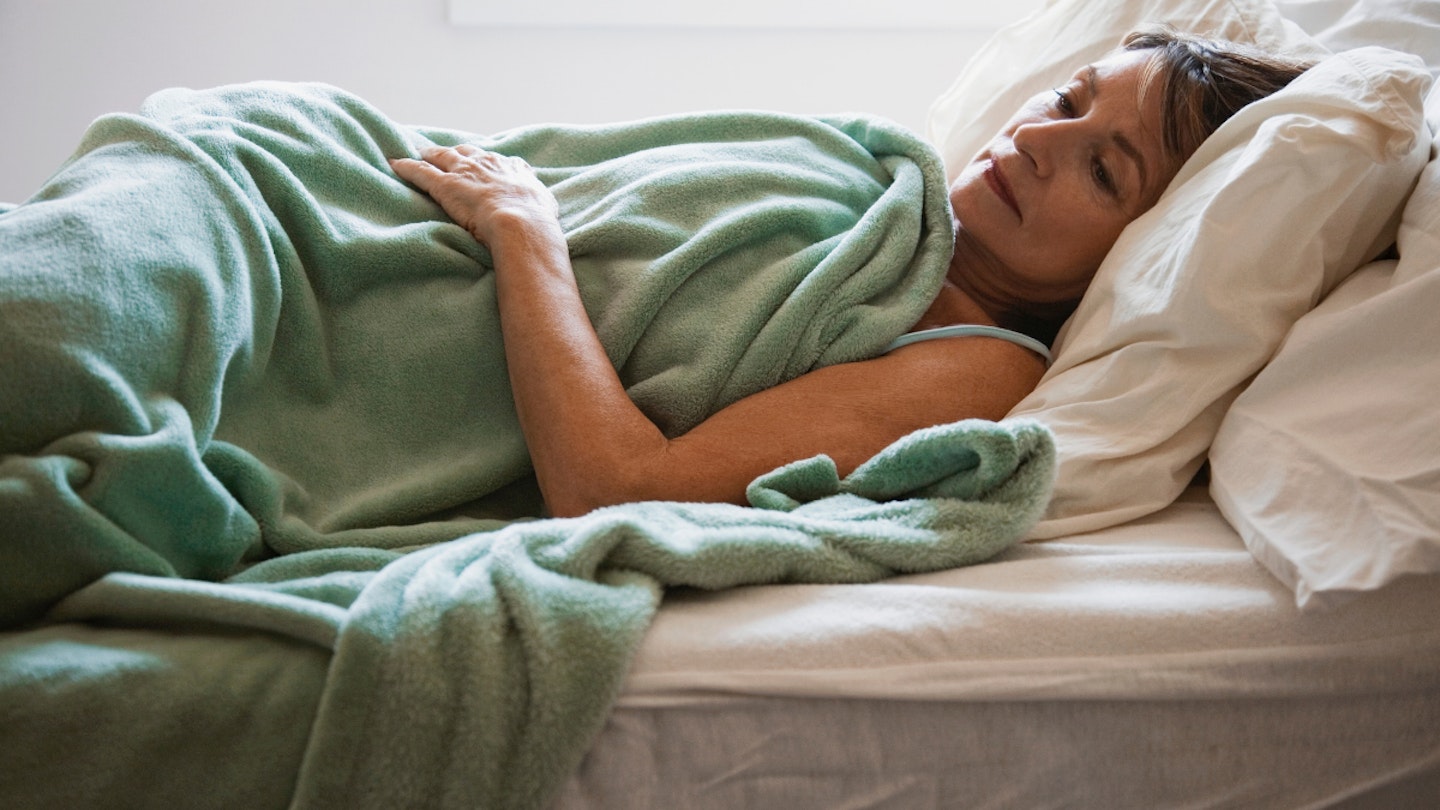The menopause comes with a variety of unpleasant symptoms including menopause anxiety and burning mouth syndrome to name a few. Another side effect can be disruption to your sleep. But what causes this? And most importantly, what can you do to help? We spoke to Dr Louise Newson, menopause specialist, GP, and founder of balance-app.com.
What sleep issues are associated with menopause?
One of the most important building blocks to living a healthy and productive life is getting adequate sleep, every night.
There are many reasons why a woman’s sleep can become interrupted during the perimenopauseand menopause. Hot flushes, night sweats, needing more frequent trips to the loo, and feeling anxious and stressed can all contribute to a bad night’s sleep. However, sleep itself can be really affected by a change in hormones.
Some women find it difficult to fall asleep when they go to bed, others struggle to stay asleep for long periods and wake frequently during the night, never feeling they have gone into a deep sleep. And some women find they wake up way too early every morning and can’t drift back off no matter what is tried.
How does menopause affect sleep?
There is a decline in three important hormones during the perimenopause and menopause that all play a role in helping us sleep. The hormones oestrogen and testosterone both have important effects on your brain, including helping the quality and duration of sleep. Oestrogen helps your body use serotonin and other important chemicals that help you sleep. Low oestrogen levels can lead to sleeping problems but also cause fatigue, difficulty concentrating, headaches, weight gain, and mood changes – a lack of sleep can further exacerbate these symptoms.
The hormone progesterone can also be beneficial for sleep as it increases the production of a chemical in our brains that works to help sleep. Progesterone can also improve relaxation and mood, so a drop in progesterone levels can lead to symptoms such as anxiety, restlessness and trouble sleeping, including a tendency to wake up frequently.
Can treating menopause improve sleep?
Treating the cause of the sleep problem itself (lack of hormones) and the symptoms that wake you up, by taking HRT, helps many women get a much better night’s sleep.
Magnesium is a very important mineral for your body, and it activates the system responsible for getting you calm and relaxed to help prepare your body for sleep; it also regulates the hormone melatonin, which guides sleep-wake cycles in your body. Many people don’t get enough magnesium from their diets and this can increase the chances of poor sleep. Drinking alcohol and coffee and experiencing stress can also reduce your body’s ability to absorb any magnesium that might have been present in your diet. Taking a good-quality magnesium supplement with vitamin B can improve sleep, as well as lower stress levels.
Can HRT help?
Hormone replacement therapy, or HRT, involves replacing the hormones declining in the body, namely oestrogen, progesterone, and in some women, testosterone.
Improving the levels and balance of these hormones, by taking HRT, helps many women sleep better because taking replacement hormones deals with the cause of insomnia and reduces the symptoms that might wake you up, for example, night sweats, needing to pass urine, and feeling worried. Women often notice they can fall asleep quicker and wake up during the night far fewer times (or even not at all) after they have been taking HRT for a few months.
Even if the odd night is still interrupted, an improvement in your hormone levels usually works to help your energy, lift your mood and sharpen your thinking skills, so the occasional bad night won’t knock you out for the rest of the day.
You may also wish to look into alternatives to HRT too.
Tips for sleeping better with menopause
Research shows the two most effective changes you can make to your night-time routines are:
1. Keep cool
It’s much easier to get to sleep and stay asleep if you are on the cool side of comfortable rather than warm. A room temperature of around 18°C is recommended as ideal for a good night’s sleep. You may find avoiding hot drinks before bed and using a cooling spray or gel or having a fan in the room helps with any hot flushes or night sweats.
.png?auto=format&w=1440&q=80)
2. Keep your routine the same every night
A consistent routine is like an anchor to your sleeping patterns. Go to bed at the same time every night and wake up and get up at the same time every morning - yes, even at the weekends if you are serious about improving your sleep! A consistent routine improves not only the quantity of sleep but the quality too, leading to a real difference in how your body will function and how you feel during the day.
Avoiding (or limiting) alcohol, caffeine and drugs such as marijuana, will help you sleep better overall. While alcohol or marijuana may help you get off to sleep, they are sedatives, so they only give you an artificial kind of sleep that does not have the same benefits as ‘natural’ sleep. They also block your dream sleep, or REM sleep, which is essential for emotional and mental health.
Stress is a big contributor to sleep disruption and while it’s not always possible to remove stress entirely from your life there are ways to minimise its impacts such as challenging unhelpful thoughts, doing some daily breathing exercises, writing down some of your worries in a wellness journal and doing something you find relaxing before bed, such as a bath or reading.
Keeping your room as dark as possible really helps your body’s natural sleep rhythms too; blackout blinds or curtains are great for this.
Meet the expert: Dr Louise Newson is a GP and Menopause Specialist who works to increase awareness and knowledge of the perimenopause and menopause, and campaigns for better menopause care for all women.
